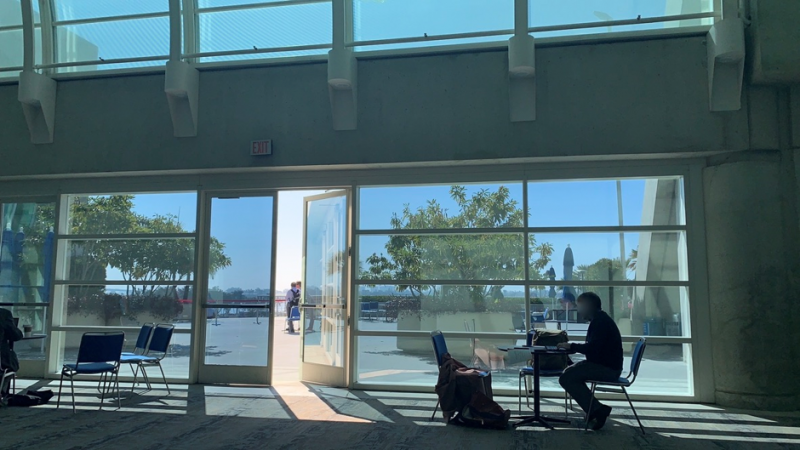Ocean Sciences 2020 - San Diego
Yixi Zheng
University of East Anglia

It was the first mega-meeting in my life. I tried my best to not get too overwhelmed by more than one hundred of sessions. The poster hall is giant and it took most people 5 mins to find their own poster boards. My poster focusing on recent work, the meltwater pathways from an Antarctic ice shelf revealed by seals, drew many people’s attention, with a very large portion from other disciplines. I normally prefer a talk than a poster but this time, poster did provide me more time to have deep conversations to other researchers and discussed about some useful feedbacks and potential future collaborations.
It was a really good conference for people who have a broad interest. I attended most sessions about high-latitude environments, which are closely linked to my research; and some sessions about data-management skills and data-driven techniques, which I have never touched before. I spent a long time visiting other people’s posters as well. Unlike a talk, which allows the speak to present her/his work for 15 mins and disappear forever, posters gave me a good chance to actually discussed with the presenters, ask questions, and share opinions.
San Diego is an amazing city with lovely sunshine and coastal city view. I met many old friends there : ) some of whom I haven’t seen for more than 3 years… We also had a nice social evening with people from our session (people from other sessions sneaked in and had fun together as well!) and had a very relaxed time.
It was a tiring week but I benefited a lot from Ocean Sciences Meeting 2020 and enjoyed my trip very much. I am very grateful for receiving the financial support from the generous Challenger Society.
I am a second-year PhD student at the University of East Anglia with Karen Heywood, Ben Webber and David Stevens. My research focuses on the ocean-ice shelf interactions in the Antarctic. Many ice shelves are melting rapidly in Antarctica which exports an increasing amount of meltwater and influences the upper ocean hydrography. My recent work aims to reveal ice-shelf meltwater’s pathways in different seasons and figure out how this seasonality can affect the sea ice formation.
Latest News
Royal Society Publishing Photography Competition 2025
Please see a message from the Royal Society below:
We are delighted to announce that the 2025 Competition is now open for entries until 15 August for a chance to win £1000! The competition celebrates the power of photography in conveying the wonder of science happening all around us and photographs can be submitted in the categories of: Astronomy, Behaviour, Earth Science and Climatology, Ecology and Environmental Science, and Microimaging.
The competition is free to enter and open to anyone studying or working in science at graduate level or above. Category winners will receive a one-year membership to the Royal Photographic Society and the overall winner will receive a grand prize of £1,000. Find out more: https://bit.ly/RSPphotocomp
October 2025 MEDIN Workshop: Marine Data Management, Governance and the MEDIN toolset
The Marine Environmental Data and Information Network (MEDIN) are pleased to announce that registration is now open for the next occurrence of our popular free online training workshop: ‘Marine Data Management, Governance and the MEDIN toolset’ on the 13th – 17th October 2025 on OceanTeacher Global Academy.
Marine Data Management, Governance and the MEDIN toolset
The Marine Environmental Data and Information Network (MEDIN) and OceanWise are delighted to invite you to attend our popular free online training workshop: ‘Marine Data Management, Governance and the MEDIN toolset’ on the 19th – 23rd of May 2025.
